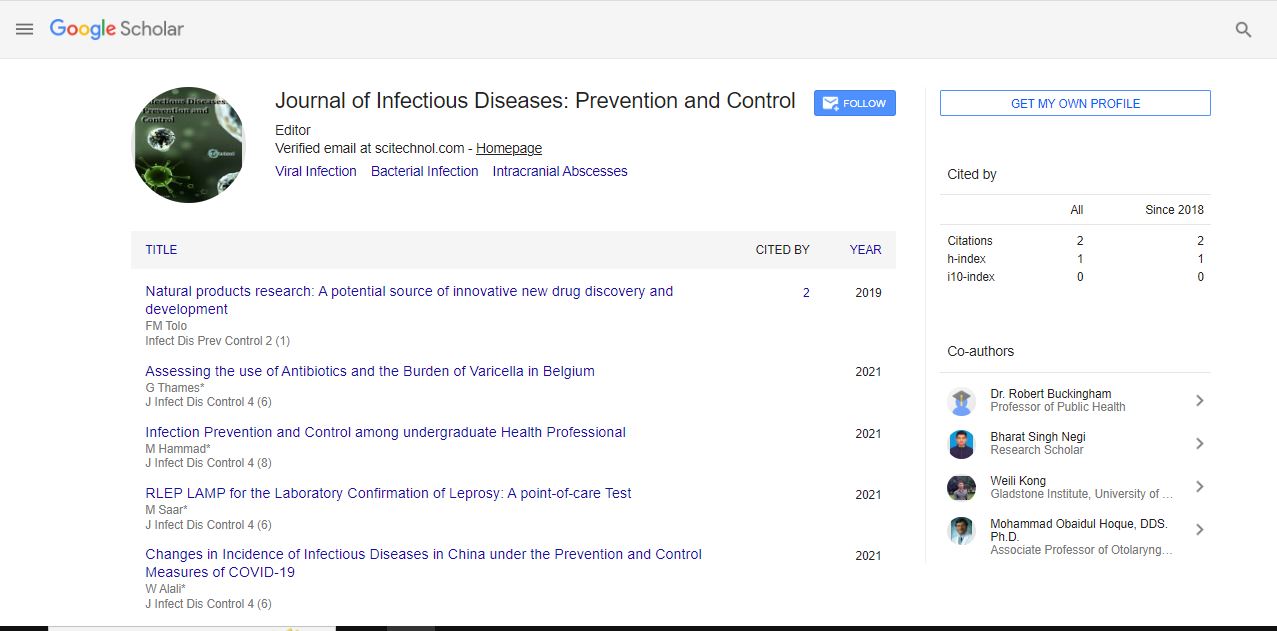Commentary, Vol: 6 Issue: 2
Advancing Medicine: The Potential of Drug Therapies
Pascale Absalom*
1Department of Pharmacology and Toxicology, Indiana University School of Medicine, Indianapolis, USA
*Corresponding Author: Pascale Absalom,
Department of Pharmacology and
Toxicology, Indiana University School of Medicine, Indianapolis, USA
E-mail: Pascaleparasitology@gmail.com
Received date: 27 May, 2023, Manuscript No. IDPC-23-105451;
Editor assigned date: 29 May, 2023, Pre QC No. IDPC -23-105451(PQ);
Reviewed date: 15 June, 2023, QC No. IDPC -23-105451;
Revised date: 23 June, 2023, Manuscript No. IDPC -23-105451 (R);
Published date: 30 June, 2023, DOI: 10.36648/idpc.5.2.131
Citation: Absalom P (2023) Advancing Medicine: The Potential of Drug Therapies. Infect Dis Prev Control 6:2.
Abstract
Drug treatments are essential to contemporary medicine because they offer alternatives for managing and treating a wide range of illnesses and ailments. This seeks to provide a thorough analysis of medication therapy, stressing their importance, modes of action, drawbacks, and hopes for the future. We explore the major classes of drugs, including small molecules, biologics, and gene therapies, focusing on their therapeutic applications and advancements. Additionally, we discuss emerging trends in drug development and personalized medicine, useful for treatment of various diseases. This serves as a valuable resource for healthcare professionals, researchers, and individuals interested in understanding the current landscape and future prospects of drug therapies
Description
Drug treatments are essential to contemporary medicine because they offer alternatives for managing and treating a wide range of illnesses and ailments. This seeks to provide a thorough analysis of medication therapy, stressing their importance, modes of action, drawbacks, and hopes for the future. We explore the major classes of drugs, including small molecules, biologics, and gene therapies, focusing on their therapeutic applications and advancements. Additionally, we discuss emerging trends in drug development and personalized medicine, useful for treatment of various diseases. This serves as a valuable resource for healthcare professionals, researchers, and individuals interested in understanding the current landscape and future prospects of drug therapies.
Drug therapy has transformed contemporary medicine by offering efficient cures for a variety of illnesses and disorders. By understanding the intricacies of drug therapy, healthcare professionals and researchers can make informed decisions and develop novel therapeutic approaches.
Small molecules represent a major class of drugs that exert their therapeutic effects through interactions with specific molecular targets. This section discusses the development and utilization of small molecules, including their mechanisms of action and examples of successful therapeutic applications. We also explore the challenges associated with small molecule drug development, such as off-target effects and drug resistance, and highlight ongoing research efforts to address these limitations.
Biologics, derived from living organisms, have emerged as a powerful class of drugs with diverse applications. Monoclonal antibodies, produced through biotechnology, can be designed to specifically target disease-causing molecules, offering precise interventions for conditions such as cancer, autoimmune diseases, and infectious diseases. Additionally, personalized vaccines, developed to an individual's specific genetic makeup, are on the horizon. This have the potential to enhance vaccine efficacy by variations in immune responses among different populations.
Through the correction or modification of the underlying genetic abnormalities, gene therapies provide a revolutionary method for treating genetic illnesses. We go into the principles of gene therapy in this section, including various delivery systems and approaches for focusing on certain genes. We highlight effective uses of gene therapy, including the treatment of hereditary retinal disorders and specific forms of cancer.
Personalized medicine aims to optimize treatment outcomes by tailoring therapies to an individual's unique genetic makeup, lifestyle, and environment. Advancements in gene editing technologies, particularly CRISPR-Cas9, have the possibility of correcting genetic mutations that underlie numerous inherited diseases. CRISPR allows scientists to precisely edit DNA sequences, potentially providing cures for conditions that were previously considered incurable. From targeting genetic mutations responsible for sickle cell anemia to exploring avenues for treating genetic forms of blindness, the applications of CRISPR are far-reaching and is well used for altering the course of genetic disorders.
Nanotechnology has empowered the creation of novel drug delivery systems that operate at the nanoscale. Nanoparticles and nanocarriers can be designed to encapsulate drugs, enhancing their solubility, stability, and targeted delivery to specific cells or tissues. This approach minimizes the side effects associated with traditional drug formulations and optimizes therapeutic outcomes. In cancer treatment, nanoparticle-based drug delivery systems can accumulate specifically in tumor tissues, increasing drug concentration at the site of action while reducing systemic toxicity.
While challenges and ethical concerns remain, the journey of drug therapy advancement continues to reshape healthcare and improve lives. As researchers, healthcare providers, and society collaborate, the potential of drug therapies will be further improved to face the medical challenges of today and tomorrow. Healthcare professionals and researchers may contribute to the creation of more effective and customised treatments by knowing the existing landscape and future possibilities of pharmacological therapy, eventually helping patients throughout the world.
 Spanish
Spanish  Chinese
Chinese  Russian
Russian  German
German  French
French  Japanese
Japanese  Portuguese
Portuguese  Hindi
Hindi 